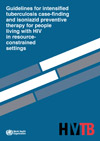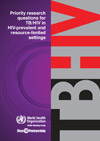Research Meetings
Making TB research a priority
"The consequences of inattention to TB research are not just embarrassing, they are tragic and shameful. Generations of research advances and technologies have bypassed the field of TB research. All of the great breakthroughs that we have seen in molecular biology - there was nobody working on it in TB.
Nine million people develop active TB each year and yet we still don't have an effective vaccine. There have been no newly licensed drugs for TB in forty years [with the exception of rifabutin]. The therapeutic regimens, although they work, are cumbersome and prone to the development of drug resistance. The diagnostics are ridiculous, they are antiquated, non-standardised and imprecise."
- Dr Tony Fauci, Director of the US National Institute of Allergy and Infectious Diseases (NIAID) at a meeting held in Cape Town just prior to IAS 2009
HIV/TB Research meeting held in conjunction with the 19th Conference on Retroviruses and Opportunistic Infections
05 March, 2012 | Seattle, USA
The World Health Organization and Consortium to Respond Effectively to the AIDS/TB Epidemic (CREATE) organized their 6th CROI affiliated HIV/TB research meeting on behalf of the TB/HIV Working Group of the Stop TB Partnership in Seattle, USA on 5 March, 2012. Attended by some 70 participants, including HIV researchers, implementers and public health policy makers, the meeting discussed critical knowledge and research gaps on TB impact and measurement of TB transmission in high HIV burden settings. Convened by Drs Richard Chaisson of John Hopkins University and Haileyesus Getahun of WHO’s Stop TB Department, the meeting was chaired by Dr Diane Havlir, Chair of the TB/HIV Working Group and Dr Gottfried Hirnschall, Director of the HIV/AIDS Department of WHO. For more information please click on the links below.
Agenda | Meeting report | Presentations
HIV/TB Research meeting held in conjunction with the 6th conference on HIV Pathogenesis, Treatment and Prevention (IAS 2011)
17 July, 2011 | Rome, Italy
The Stop TB Department of the World Health Organization and the Secretariat of the TB/HIV Working Group of the Stop TB Partnership in collaboration with the Consortium to Respond Effectively to the AIDS/TB Epidemic (CREATE) convened a meeting in Rome on Sunday 17 July 2011, to promote high level scientific interchange of ideas and research priorities on the development of new and novel anti-TB drugs for people living with HIV with specific issues related to childhood TB and people living with HIV. Held in conjunction with the 6th conference on HIV Pathogenesis, Treatment and Prevention, the meeting shared new data from ongoing studies, discussed implementation issues and identified critical research questions. For more details on this meeting and for links to the abstracts, added to our Roadmap of HIV/TB Sessions at IAS 2011, please click on the links below:
Meeting report with presentations | Agenda | IAS 2011 HIV/TB Abstracts
TB/HIV Research Frontiers meeting at the 18th Conference on Retroviruses and Opportunistic Infections (CROI 2011)
27 February, 2011 | Boston, USA
The Stop TB Department of the World Health Organization and the Consortium to Respond Effectively to the AIDS/TB Epidemic (CREATE) organized an HIV/TB research frontiers meeting on behalf of the TB/HIV Working Group of the Stop TB Partnership affiliated with the 18th Conference on Retroviruses and Opportunistic Infections (CROI 2011) in Boston, USA on 27 February, 2011. The meeting was co-chaired by Dr Diane Havlir, the chair of the TB/HIV Working Group and Dr Richard Chaisson from Johns Hopkins University and CREATE, and was attended by about 80 HIV researchers and policy makers, including Ambassador Eric Goosby, the United States Global AIDS Coordinator. The main objective of the meeting was to discuss emerging and unpublished data about the new Xpert MTB/RIF diagnostic tool and explore its implication in the diagnosis of TB among people living with HIV. The meeting also discussed the implication of the mouse model for the development of new TB drugs and explored its implication for people living with HIV. TB/HIV received high profile at the main conference this year with a symposium on "Colliding epidemics: Controlling HIV-related TB" co-convened by the Stop TB Department of WHO and the University of San Diego, as well as results of the STRIDE and SAPIT randomized control trials on when to start ART in TB patients living with HIV presented. For the more in-depth report please visit the link below.
Meeting report with presentations
CROI 2010
TB/HIV Research Frontiers meeting
16 February, 2010 | San Francisco, USA
The Stop TB Department of the World Health Organization and the Consortium to Respond Effectively to the AIDS/TB Epidemic organized an HIV/TB research frontiers meeting on behalf of the TB/HIV Working Group of the Stop TB Partnership affiliated with the 17th Conference on Retroviruses and Opportunistic Infections (CROI 2010) in San Francisco, USA on 16 February, 2010. This was the fourth in a series of meetings organized by WHO and CREATE since 2007. The meeting was co-chaired by Dr Kenneth Castro, Assistant Surgeon General and Director of Division of Tuberculosis Elimination Centers for Disease Control and Prevention and Dr Alison Grant, Head of the Clinical Research Unit in London School of Hygiene and Tropical Medicine. Attended by more than 65 HIV researchers and public health policy makers, the main objective of the meeting was to promote high level scientific interchange of ideas and debates around isoniazid preventive therapy (IPT) and its role in improving survival among people living with HIV so as to generate questions for future research. New data on the impact of IPT on mortality of people living with HIV was presented from Botswana, India and South Africa. For the more in-depth report please visit the link below.
Meeting report with presentations
TB/HIV at IAS 2009, Catalysing HIV/TB research: innovation, funding and networking
18-21 July 2009 | Cape Town, South Africa
The World Health Organization and the TB/HIV Working Group of the Stop TB Partnership in collaboration with the Consortium to Respond Effectively to the AIDS/TB Epidemic (CREATE), International AIDS Society, Treatment Action Group and the Desmond Tutu HIV Centre of University of Cape Town organized a highly visible meeting in conjunction with the 5th IAS Conference on HIV Pathogenesis, Treatment and Prevention in Cape Town, South Africa on 18-19 July, 2009. The meeting was attended by some 250 HIV researchers, activists and representatives from funding agencies, including well-known figures such as Dr Fauci and Nobel Prize winner Dr Françoise Barré-Sinoussi of the Institut Pasteur. The meeting focused on critical TB/HIV issues in the areas of TB prevention, diagnosis and treatment, childhood TB and drug resistant TB. New and previously unreported data was shared, discussed and research priorities were defined. The research priority discussions during the meeting also informed the ongoing revision of the TB/HIV research priorities document. The outcome and key findings of the meeting were communicated to the IAS conference delegates through a satellite symposium on 21 July, 2009. For a more in-depth report, by Theo Smart of HATiP and for the presentations please visit the links below.
Meeting report | PresentationsTB/HIV at CROI 2009
8-11 February 2009 | Montreal, Canada
The Stop TB Department of WHO in collaboration with the Consortium to Respond Effectively to the AIDS/TB Epidemic (CREATE) organized a meeting affiliated with the 16th Conference on Retroviruses and Opportunistic Infections (CROI 2009) in Montreal, Canada. The main objective of the meeting was to promote high level scientific interchange of ideas and research priorities to have a better understanding of the magnitude and burden of TB (including drug resistant strains) especially in HIV prevalent settings.
List of participants | PresentationsTB/HIV at CROI 2008
3 February, 2008 | Boston, USA
The Stop TB and HIV/AIDS Departments of the World Health Organization (WHO) in collaboration with the Consortium to Respond Effectively to the AIDS TB Epidemic (CREATE) hosted a HIV/TB meeting as an affiliated event to the 15th Conference on retroviruses and opportunistic infections (CROI 2008) on behalf of the TB/HIV Working Group of the Stop TB Partnership. The meeting held on February 3, 2008 in Boston, USA was attended by more than 50 leading HIV researchers, policy makers and representatives from funding agencies. The main objectives of the meeting were to review ongoing research efforts, promote interchange of scientific ideas on unmet research needs and discuss priorities around the prevention of TB (isoniazid preventive therapy) and enhanced TB case finding (TB screening) among people living with HIV (PLHIV).
Agenda | List of Participants | Meeting report | Presentations
HIV/TB sessions at IAS 2007
22-24 July 2007 | Sydney, Australia
The TB/HIV Working Group Secretariat of the Stop TB Partnership convened a satellite symposium in conjunction with the 4th IAS Conference on HIV Pathogenesis, treatment and prevention in collaboration with the Forum for Collaborative HIV Research, Agence nationale de recherches sur le sida (ANRS), Bill and Melinda Gates Foundation, Consortium to Respond Effectively to the AIDS/TB Epidemic (CREATE), the European and Developing Countries Clinical Trials Partnership Programme (EDCTP) International AIDS Society, National Institutes of Health and Tibotec. The goals of the symposium were to increase awareness of and interest in, the urgent need to include TB diagnosis, prevention and treatment issues into the HIV clinical research arena, and to discuss with programs and sponsors opportunities for increased focus on HIV-TB coinfection and examples of supportive and facilitating programs they may offer. The panel discussants included Michel Kazatchkine (Executive Director of the Global Fund for AIDS,TB and Malaria), Michel Sidibe (Deputy Executive Director of UNAIDS), Debrework Zewdie (Director, Global AIDS Programme, World Bank) and Kevin DeCock (Director of HIV/AIDS Department, WHO).
Agenda | More information | Roadmap
TB/HIV meeting held in conjunction with the 14th conference on retroviruses and opportunistic infections
25 February 2007 | Los Angeles, USA
The Global TB/HIV Working Group of the Stop TB Partnership in collaboration with the Consortium to Respond Effectively to the AIDS TB Epidemic (CREATE) convened a TB/HIV meeting in conjunction with the 14th Conference on retroviruses and opportunistic infections in Los Angeles, USA. The meeting was attended by more than 40 leading researchers in the field and was co-chaired by Dr D. Havlir, Chair of the Global TB/HIV Working Group and Dr S. Lehrman Director, Therapeutics Research Program, Division of AIDS, NIH, USA. The main objective of the meeting was to share and discuss key TB/HIV research priorities including TB prevention in people living with HIV, a screening algorithm to rule out TB, best tools to diagnose latent TB and single dose prophylaxis for people living with HIV.
Meeting report with presentations
TB/HIV research priorities in resource-limited settings
14-15 February 2005 | Geneva, Switzerland
CREATE - Archbishop Desmond Tutu to launch the ZAMSTAR TB/HIV study
15 February 2005 | Cape Town, South Africa
Archbishop Desmond Tutu will officially launch a study of community and household interventions to reduce the impact of HIV related TB at the opening of the Desmond Tutu TB centre in Cape Town. As part of the Consortium to Respond Effectively to the AIDS/Tuberculosis Epidemic (CREATE) this community randomized trial will study the effects of TB/HIV activities at household and community level in Zambia and South Africa over 5 years. For more information on the Zamstar project click here.




 Intensive case finding and isoniazid preventive therapy guidelines, 2010
Intensive case finding and isoniazid preventive therapy guidelines, 2010
 Priority research questions for TB/HIV in HIV-prevalent and resource-limited settings, 2010
Priority research questions for TB/HIV in HIV-prevalent and resource-limited settings, 2010